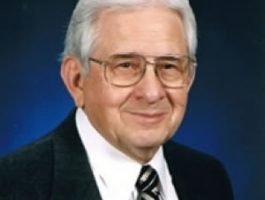
Mercy at Sea
When Ed Harrell heard the orders to abandon ship he had no idea what the next few days had in store for him--dehydration, shark attacks, oil burns, hunger. Miraculously, God spared his life, and he shares his amazing story with Dennis Rainey on today's broadcast.
Show Notes
About the Host
About the Guest
-
When Ed Harrell heard the orders to abandon ship he had no idea what the next few days had in store for him--dehydration, shark attacks, oil burns, hunger. Miraculously, God spared his life, and he shares his amazing story with Dennis Rainey on today's broadcast.
-
Dave and Ann Wilson
Dave and Ann Wilson are hosts of FamilyLife Today®, FamilyLife’s nationally-syndicated radio program. Dave and Ann have been married for more than 38 years and have spent the last 33 teaching and mentoring couples and parents across the country. They have been featured speakers at FamilyLife’s Weekend to Remember® marriage getaway since 1993 and have also hosted their own marriage conferences across the country. Cofounders of Kensington Church—a national, multicampus church that hosts more than 14,000 visitors every weekend—the Wilsons are the creative force behind DVD teaching series Rock Your Marriage and The Survival Guide To Parenting, as well as authors of the recently released book Vertical Marriage (Zondervan, 2019). Dave is a graduate of the International School of Theology, where he received a Master of Divinity degree. A Ball State University Hall of Fame quarterback, Dave served the Detroit Lions as chaplain for 33 years. Ann attended the University of Kentucky. She has been active alongside Dave in ministry as a speaker, writer, small-group leader, and mentor to countless wives of professional athletes. The Wilsons live in the Detroit area. They have three grown sons, CJ, Austin, and Cody, three daughters-in-law, and a growing number of grandchildren.
-

Ed Harrell
Edgar Harrell owned and operated the Pella Window Company, Inc., Rock Island, Illinois for thirty-five years until his retirement in 1985. During the years 1970 to 1985, he served on the board of trustees of the Moody Bible Institute, in Chicago, Illinois, and has been a popular Bible teacher and lay minister throughout his adult life. He has enjoyed many years of fishing and big game hunting in the Rocky Mountains from Alaska to New Mexico, and currently resides in Clarksville, Tennessee with h...more
When Ed Harrell heard the orders to abandon ship he had no idea what the next few days had in store for him–dehydration, shark attacks, oil burns, hunger.
Bob: Sixty five years ago this month, Ed Harrell was afloat in the Pacific. His ship, the cruiser USS Indianapolis, had been sunk by Japanese torpedoes. Many of the crew members had not escaped. Those who had, found themselves battling for their lives on the open seas with no help in sight. What was in sight were sharks.
Ed: You can't imagine, and I can't explain, you know, the feeling that you have. You know that at any moment that the shark could get you, and you wonder, you know, am I going to be next? You pray and you pray more and you pour your heart out to the Lord, and just hope and pray that somehow, some way, that He will be faithful to the promise that you feel that He's made to you and that you'll be able to endure.
Bob: This is FamilyLife Today for Wednesday July 7th. Our host is the President of FamilyLife, Dennis Rainey, and I'm Bob Lepine. We'll hear a powerful story today of courage and faith as we speak with one of the survivors from the USS Indianapolis.
And welcome to FamilyLife Today, thanks for joining us. I somehow missed this in my study of U.S. history. I don't know that I ever was aware that on the night of July 30, 1945, just weeks before the end of World War II, a Japanese submarine, I-58, launched a spread of torpedoes at the USS Indianapolis in the Pacific Theater.
Two of those torpedoes found their mark and, in less than 15 minutes, this cruiser sank in the Marianas, and there were almost 1,200 men on board the ship. More than 800 of those men did not survive the attack or the days that followed that attack. And I don't know, Dennis that I’d ever heard about that battle or about the sinking of the ship but it's truly a compelling story, especially when you consider that some 300 men were rescued days later.
Dennis: Yes, and we have one of those men who was rescued back with us. Ed Harrell joins us again on FamilyLife Today. Ed, welcome back.
Ed: Thank you.
Dennis: I want to express my appreciation for you, as a veteran, just for serving our nation and also for coming here on our broadcast and telling the story, a dramatic story, of what has to be one of the most phenomenal survival stories, really, Bob, in all of the World War II and maybe in the history of the United States. I mean, what you had to endure and go through. But we'll get to that in just a moment.
Ed is a businessman, was on the board of trustees of Moody Bible for a number of years. He and his wife, Ola, have a couple of children and a number of grandchildren and great-grandchildren, and he is a survivor of the USS Indianapolis.
Ed, I want you to take our listeners back, because you shared earlier the story of standing on the deck of this boat—this great, massive boat, over 600 feet long, at midnight as it's sinking in less than 15 minutes. What were you hearing at that moment? It's pitch black, there's a little bit of light from the fires that are burning mid-ship, but what was the sound like? Was it of screams of people? Were there explosions?
Ed: There were still explosions going on for a good while. In fact, when the ship actually went under there were still explosions that were taking place below deck. I don't know that I'm waiting to listen to see what might be taking place.
I am eager to get off, and I make my way, then, to the port side and hung onto that rail and said my prayer before I entered into the water, and I knew, beyond any shadow of doubt, that the Lord had, through the Spirit, was bearing witness with my spirit that He was with me and that I would make it, somehow, some way.
I know, later on, when I was interviewed, they asked me, "What were you thinking out there? Did you think that you were going to make it?" I said, "I thought of the 30-day leave that I would get for being a survivor and be able to go home," because I hadn't been home for a good while, and I was thinking about going home, frankly.
Bob: You had one what you've described as a kapok jacket, a life preserver, is that what that was?
Ed: That's right.
Bob: And I guess I'm wondering—were there lifeboats on board the ship? Were there inflatable rafts? Was it "man the lifeboats"?
Ed: No word of that kind was given. In fact, you didn't have time, they didn't have time. I could look up and see life rafts hanging, and those kapok jackets hanging, but no word was given to cut those loose, and I never saw a life raft.
There were floater nets, likewise, that later floated up, and they spread them out, and boys could somewhat stand in those—not completely, but at least it would keep the sharks from coming up through after them. And then the life rafts, then, some of those floated loose, but I never saw a raft. I never saw one in the water the whole time.
Dennis: That first moment you hit the water, you burst through the surface, you got clear of the oil so you could breathe. Did you begin swimming away from the sinking ship at that point? I mean, again, to those of us who are laymen, a ship going down is supposed to create some kind of vacuum and suck survivors back down after it. Did that occur?
Ed: That was my thinking, and I was I a rush–not necessarily a good swimmer, but I was in a rush to get away from the ship, and I got away from it maybe 50 yards, then, to turn, then, to watch it as it sank. I could still hear some explosions as it was going under.
Then, actually, as the ship went under, and all of that water that was in the bow, you know, you can imagine the ship is going down and all the water in there, as it's pushing up through the ship, the ship is giving a real—I call it kind of a whissing sound in that that area is pushing out, and a tremendous amount of air is coming out of the ship as it went under, and I could hear that. But that was about—no suction.
Different ones claim that they actually were pulled under and some with kapok jackets were pulled under, and then the kapok jacket then pulled them back up. So it wasn't the suction that I had been led to believe that would be the case in such a sinking.
Bob: And it's the middle of summer in the South Pacific, so I'm imagining that water temperature may have been warm? Although you had a blanket around you when you were on board ship. Was it chilly?
Ed: Well, we were traveling, you know, right out in the open about 17 knots, so 15 miles an hour, so to speak. I needed that blanket around me to keep the chill off of me, because it would be a little chilly and, yes, at night the water was cool. In fact, the water in the Pacific at that time was about 85 degrees and, of course, if you stay in the water, you know, long, at 85 degrees then your body temperature is going to drop to 85 degrees or close to that.
Yet, in the daytime, then, you're going to warm up to 100 degrees. So you burn up in the daytime, and you're desperate for water because you're swimming most of the time. You're either swimming to stay in a group, or you're swimming to get back into a group when you've come upon a swell, and you've kind of been separated. And you can imagine, you know, when we had 50 or 70 or so boys, and you go up on a swell 20-feet high, and that breaks away, then you're separated maybe by 50 yards.
So just nearly immediately, even the first day, we learned that we needed to take our kapok jackets and kind of hook onto each other and stay together. In fact, we had some that didn't have life jackets, and we had some boys that were injured, and we'd try to keep them in the center of our group or else we were separated completely.
Bob: How big was your group that you were linked together with? That first night you swam over to a group and I'm sure started talking about what do we do and how do we prepare for whatever is ahead. How many guys were around you?
Ed: The best that we could count there were 80 in our group and, of course, again, it's night, right after midnight, but the best that we could take inventory, there were 80 of us. I had two other Marines with me, and one of them had been blown up against the bulkhead. He had multiple breaks in his body, and he couldn't stand for me to even hardly touch him, to give him any assistance. But he did have a life jacket, and then the other Marine buddy, then, had gone into the water head first and had gotten all that oil, then, in his eyes, and he's going to suffer with that, now, the next few days – tremendous suffering that he experienced the next few days.
We all were concerned, number one, with number one. But we were concerned with some of those that were injured, and some that didn’t have lifejackets. There wasn’t a lot of, so-called, conversation that was going on. We did wonder if we got an SOS off. We weren’t sure whether or not that had gotten off. Because we knew that all communication was knocked out, all power was knocked off. We wondered, “Well, did they get the battery operated SOS working at the time.
Bob: That’s pretty critical. You’re out in the middle of a pretty big ocean, you weren’t hearing airplanes flying overhead or seeing ships off on the horizon, any of that were you?
Ed: We saw planes flying so high we nearly could not hear them. But otherwise we saw nothing.
Dennis: Do you remember the dawn on that first morning?
Ed: I can remember the dawn very well the first morning, because we had company. We had sharks, and we had lost maybe a dozen or so boys that night …
Dennis: of the 80?
Ed: Of the 80, and yet we still had their kapoks and them with us. Then sometime in the morning, I don't recall just exactly how and when we did it, but we removed their dog tags and someone supposedly kept those, and then we released them and gave them a so-called proper burial there at sea. Someone–there was an officer or two there with us that someone would say The Lord's Prayer, and that was about the extent of their burial.
Then it was up in the day, maybe a little bit later before the sharks really began to come around us too much. And, really, they didn't seem to want to attack our group. As long as we stayed in a group they didn't bother our group.
That’s another reason why we tried to fasten ourselves together and form a circle to keep everyone intact. If someone would break loose and swim out, then, all of a sudden, you would hear a bloodcurdling scream, and you'd look and see that kapok jacket went under, and then suddenly it would come back up and there would be sharks and they would be fighting over the remains there for a little bit. So that began to take place all that first day.
Dennis: That had to be absolutely terrifying. I mean, you'd see the dorsal fins above the surface, circling you?
Ed: We'd see them circling us and nearly, at any given time, if maybe you didn't see them, and you'd wonder, "Well, maybe they've gone." Just put your head in the water and, of course, you could see them–you know, maybe there would be 20, you know, 12, 15-foot sharks swimming around down under you.
The first day they weren’t bothering us that much. Yet, whether they are attacking you or not, you know, you're still frightened to death. More so the second day, they would be swimming under you and around you and even through the group. Then, you draw your feet up tight, you draw your gut up, and you're so tense that–well, you can't imagine, and I can't explain the feeling that you have when you know that at any moment that the shark could get you.
And maybe the next moment, your buddy that's within five feet of you, a shark hits him and takes a leg off or disembowels him or an arm is gone, and yet you wonder, "Am I going to be next?" And yet, you pray and you pray more. You pour your heart out to the Lord and just hope and pray that somehow, some way that He will be faithful to the promise that you feel that He's made to you and that you'll be able to endure.
But you wonder, too, how much longer, you know, can you endure? And then when you see, you know, maybe by the second day that 20 of them or so are gone, and by the third day at noon, there are 17 of us.
I had a sailor come up to me and said, "Hey, Marine, see that island over there? I just came from over there." He said, "Captain Parks, Lieutenant Stouffer, Sergeant Cromley, they're over there. They're having a picnic. They want you to come over."
You would hear him and you would think that he knows exactly what he's talking about but you've seen what's been happening here for these two days. You see the boys that had succumbed to drinking some of the their salt water and within 15 minutes after they have had a good drink of salt water you’d see what happens to them. You'd see them begin to hallucinate and begin to thrash in the water and begin to scream and yell and have just all kinds of contortions. Then you knew what is going to happen.
I know this one that saw my Marine buddies out there, he swam away, and he got away maybe 25 yards and, all of a sudden, that bloodcurdling scream. I looked to see and saw that kapok jacket go under, and a little bit later then the kapok comes back up with part of the body still fastened to the kapok jacket.
Bob: There had to be a fear and grief. I mean, fear because sharks are all around you. You don't know if there's anybody that even knows you're out there, what's going to happen to you? And then the grief – these are buddies, and to watch them swim away and watch a shark take their life over and over again. How did you handle that emotional trauma? You just had to keep focused and keep pressing ahead.
Ed: You had to keep praying. I know my one Marine buddy that actually did make it–not in my group–later, he left us, and–but, anyway, he was a survivor, and he tells in his testimony that Harrell–I actually was his squad leader, and he said, "Harrell, he was always praying and quoting Scripture," and he called me a hard-shell Christian. I told him later, I said, "You could have called me a hard-head Christian. But he called me a "hard-shell Christian. He was always praying and quoting Scripture."
And he was asked, "Do you think that did any good? Did that help to save you?" And he said, "Well, we survived, and I think it did."
Dennis: You quoted the 23rd Psalm over and over and over again.
Ed: Right.
Dennis: That brought comfort to your soul?
Ed: You know, when you think of the psalm, you say, "The Lord is my shepherd, He maketh me to lie down” in other words the word "He" the personal pronoun, the Lord. And then after you say it a time or two, then you say, "The Lord is MY shepherd. He maketh ME to lie down in green pastures." And so you apply it to your own heart, and then you feel that He hears you and that He responds. Then you see a buddy go and then you're spared and then you feel that the Lord somehow, some way, has given you assurance that He's still with you and that you're going to make it.
Then on the second day when you're so thirsty that you're tongue begins to swell in your mouth, and you get to where you can't talk properly, and you're praying for water, swimming in it, but you know that you can't drink it. You know the poison that it contains, especially in a dehydrated body, and you've seen your buddies drink some of that.
I saw boys, as they would hold–tear off some of their clothing and take some water and put it up in that piece of cloth and put their head down under it and drink some of that, thinking that maybe it's got some of the salt out. They were desperate for water. And yet maybe in 15 minutes, then you begin to see them jerk and quiver and thrash in the water. Then they began to be not too coherent and they began to imagine all kinds of things.
So I knew I couldn't drink that, but then you pray for water, and it was sometime that second day that we had prayed and even as a group we prayed. I often say that there's no such thing as an atheist in foxholes and no atheist out there. Everybody either prayed, or they would ask you to pray, and we prayed. And so we're praying for water. We have to have it, or else we aren't going to survive, we think.
And then after our little prayer meeting, then to look up and see a little cloud out in the distance, and seeing, as it got closer and closer, and as it got closer, you could see that it's raining. And you open your mouth heavenward, you know and you thank the Lord, and you take your hands, and you put up to your mouth and you kind of funnel the water as that little cloud moved over. I don't know whether I got two or three tablespoons full of water, but nevertheless I got some water there on that second day, and then there were other reminders later in the other days where the Lord gave me assurance that He was with me.
Dennis: It's been 60 years. I'm listening to you tell this story with emotion that seems as fresh as though it happened yesterday—the Lord is my Shepherd, He leadeth me, He restores.
Ed: Right.
Dennis: And, you know, in hearing your story, there have to be listeners right now who may not be in the middle of an ocean, but they're in the middle of a crisis, and they're encircled, and it's pain, it's panic, it's chaos, it's bedlam.
The Lord is still the same Good Shepherd. He invites you to come unto Him, and He'll lead you beside the quiet streams and the green pastures, and He will restore. But you have to take Him at His word, and you have to pray that prayer, Ed, like you prayed—"The Lord is MY shepherd," I am praising. He does lead me and for that person right now, I just would invite you. Maybe you've given the 23rd Psalm 100 times, maybe you've read it, memorized it, maybe it's time to believe it and to express it.
Bob: If there is somebody listening who wants to understand what it means to surrender your life into the care and control and the lordship of the one who is the Great Shepherd, I want to invite you to call us at 1-800-FL-TODAY, there’s a book we’d love to send you called Pursuing God, that explains what it means to be a Christian and how to become a Christian. How to simply express what is on your heart and to trust God to care for you, and to forgive your sin, and to transform your life.
You can call 1-800-FL-TODAY, just ask for a copy of the book Pursuing God, we are happy to send it to you and we are trusting that God will use this book in your life to bring you into a saving relationship with Him. It may not be the same kind of saving relationship that you experienced, Ed out in the middle of the Pacific, but it is a saving relationship that saves us from God’s judgment and God’s wrath being poured out on us because of what Christ has accomplished. Again, call -800-FL-TODAY, ask for a copy of the book Pursuing God.
Then, let me also encourage you to get a copy of Ed’s book, which is called Out of the Depths. It tells the story of the sinking of the USS Indianapolis and the survivors. We’re making this book available this month to those of you who can help support the ministry of FamilyLife Today with a donation of any amount.
We are listener supported; your donations are what keep us on the air on this station and on our network of stations all across the country. Many of you who have listened to FamilyLife Today for a long time have made donations in the past and we’re grateful for that. You’ve made today’s program possible by those donations.
Now, we’re asking those of you who maybe never made a donation, or if it’s been a while since you’ve made a donation, would you consider calling 1-800-FL-TODAY? Make a donation over the phone, and when you do just ask for a copy of the book Out of the Depths about the sinking of the Indianapolis.
Or go online at FamilyLifeToday.com. You can make your donation online. Just type the word “DEPTHS” into the key-code box on the online donation form, and we’ll send you a copy of Ed Harrell’s book as a thank you gift for your support of this ministry. We do appreciate your partnership with us and your financial support.
We want to invite you back tomorrow when we’re going to continue our conversation with Ed Harrell. In fact we’re going to hear about how Ed almost gave up hope on the third day that he was at sea. In fact, some of the guys he was with did give up hope. We’ll hear more about that tomorrow.
I want to thank our engineer today, Keith Lynch, and our entire broadcast production team. On behalf of our host, Dennis Rainey, I'm Bob Lepine. Join us back tomorrow for another edition of FamilyLife Today.
FamilyLife Today is a production of FamilyLife of Little Rock, Arkansas.
Help for today. Hope for tomorrow.
We are so happy to provide these transcripts for you. However, there is a cost to transcribe, create, and produce them for our website. If you've benefited from the broadcast transcripts, would you consider donating today to help defray the costs?
Copyright © FamilyLife. All rights reserved.
www.FamilyLife.com





